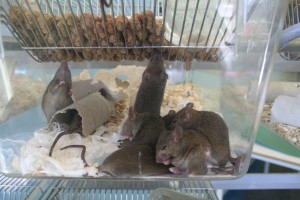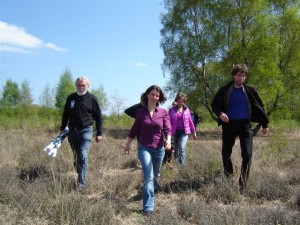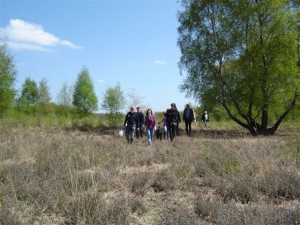Worldlog Settimana 21 – 2013
Grandioso, siamo riusciti a compare quasi 100.000 mq della natura più vulnerabile all’asta dell’ente forestale statale! In due settimane e mezzo abbiamo raccolto un quarto di milione di euro solamente con appelli sui social media, spot radio e con l’aiuto della trasmissione radio “Vroege Vogels” e i nostri soci. Così abbiamo protetto i più vulnerabili valori della natura dal mercato. Per quanto sappiamo, questo è stato la più iniziativa cittadina nel campo dell’acquisto di natura mai fatto. Più informazioni sull’asta della natura e la nostra azione potrai trovare nei miei Wordlogs delle scorse due settimane.
Sono molto felice che cosi tanti amanti della natura si siano mobilitati per quest’azione positiva per salvare parti vulnerabili della natura. Il fatto che abbiamo raccolto un importo cosi importante in così poco tempo, indica che la distruzione della natura sta a cuore alla gente. Il Partito per gli Animali continuerà – dentro e fuori dal parlamento – a opporsi contro l’ulteriore svendita della natura. Uno stato che indica di non apprezzare la natura oltre il prezzo del substrato apparentemente conosce il prezzo ma non il valore della natura. Questa meravigliosa citazione di John Sawhill si applica perfettamente a questo caso: Una società non è definita sola da quel che crea, ma da quello che si rifiuta di distruggere.
Il fatto che noi abbiamo fatto l’offerta più alta su alcuni lotti, purtroppo ancora non è garanzia che il partito realmente ottiene la natura. Dopo la fase d’offerta dell’asta segue ancora la fase di concessione fino al 24 maggio. L’attuale proprietario l’ente statale forestale deve concederei lotti di natura al nuovo proprietario. Seguiranno allora ancora notizie!
La settimana scorsa ho chiesto al sottosegretario per gli affari economici, durante il dibattito sulla sperimentazione sugli animali, di investire, assieme all’industria, il mondo accademico, le scuole e organizzazioni sociali, in alternative alla sperimentazione sugli animali. L’ente di ricerca ZonMW ha evidenziato che nel 2025 l’uso di animali per la sperimentazione può essere ridotto del 40% migliorando con ciò la qualità della salute pubblica e allo stesse tempo aumentando l’occupazione.
I dati più recenti fanno vedere che il numero degli animali da laboratorio nei Paesi Bassi è cresciuto del 2,5 percento nel 2011. In quell’anno c’erano più di un milione di animali da laboratorio e 589.853 sperimenti sono stati eseguiti su animali vivi. Oltre a questi numero di animali si uccide un altro mezzo milione di animali direttamente nei laboratori perche, dopo essere stati allevati, non soddisfano i criteri di selezione per un test.
Ci sono tutte le ragioni per scommettere sulle tecniche senza animali da laboratorio, da tutti medicinali testati con animali da laboratorio, circa il novanta percento non superano la prova quando si eseguono i test sugli esseri umani. Per metodi di trattamenti più efficaci servono nuovi modelli. Impegniamoci nell’interesse dell’uomo e gli animali.
Anche se i Paesi Bassi sono scesi dal quarto al decimo posto, siamo ancora nel top 10 dei paesi con il più crudele trattamento degli animali. Noi continuiamo a fare del nostro meglio per eliminare i Paesi Bassi da questa classifica!
E tu, sai cosa costa veramente un hamburger? Guarda questo filmato per scoprire tutti costi nascosti di un hamburger.
Altre foto che ti rubano il fiato al Big Picture del The Boston Globe! Questa volta un report fotografico del National Geographic Traveller 2013.
Alla prossima settimana, Marianne
Wonderful! We managed to buy the freedom of almost 100,000 square meters of the most vulnerable nature at the auction of Staatsbosbeheer! In 2.5 weeks’ time, we managed to raise a quarter of a million Euros by social media calls, radio spots and support from the radio show Early Birds, and our own members. By doing so we are protecting the most vulnerable nature values against the market. As far as we know, it was the biggest citizens’ initiative ever to buy nature. More information about the nature auction and our action can be found in my Wordlogs of the past two weeks.
I am really pleased that so many nature protectors supported our positive action to save the weak plots of nature. The fact that we managed to raise so much money in such a short time shows that people are concerned about the deterioration of nature. But the Party for the Animals will continue to oppose to the further sale of nature, inside and outside Parliament. A government that shows not to value nature more than the price of the ground it is on, is obviously a government that knows the price but not the value of nature. The great quote by John Sawhill fully applies to this case: A society is defined not only by what it creates, but by what it refuses to destroy.
Being the highest bidder is unfortunately no guarantee that the Party will actually obtain the plots of nature. After the descending price process at the auction, the awarding process is on until the 24th of May. The current owner, the National Forest Service, has to award the plots to the new owner. To be continued!
In the debate about animal testing last week, I asked the State Secretary of Economic Affairs to jointly invest with the industrial sector, academic world, education and social organisations in finding alternatives for animal testing. Research Agency ZonMW recently made clear that the use of test animals can be reduced by 40 per cent in the year 2025, and that the quality of healthcare and the employment will improve as a result.

Most recent figures show that the number of test animals in the Netherlands has risen by 2.5 per cent in 2011. In that year, there were more than one million test animals in the Netherlands and 589,853 experiments were carried out on live animals. In addition to this number of animals, there are another half a million animals that are put down immediately in test animal laboratories, because they, after breeding them, do not meet the selection criteria for a test.
There is every reason to aim for animal test-free technologies. Animals are not humans. Approximately ninety percent of all medicines developed with animal testing drop out when tested on humans by means of clinical trials. New models are needed for more effective treatment methods. Let’s aim for that in the interest of humans and animals.
It’s true that the Netherlands has dropped from the fourth to the tenth place, but we are still in the top 10 of countries that are most cruel to animals. We will continue to do our best to get the Netherlands out of this top 10!
And do you know what the real price is of a hamburger? Watch this short film to discover all the hidden costs of a hamburger.
And again some breathtaking pictures at the Big Picture of The Boston Globe! This time it is a photo report of the National Geographic Traveller 2013.
See you next week, Marianne


